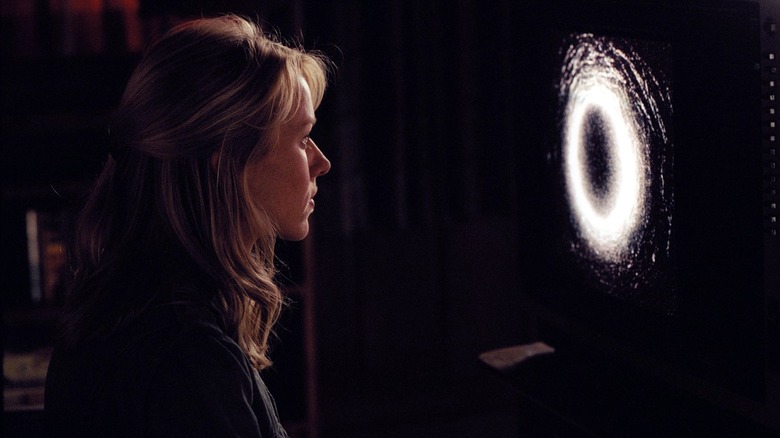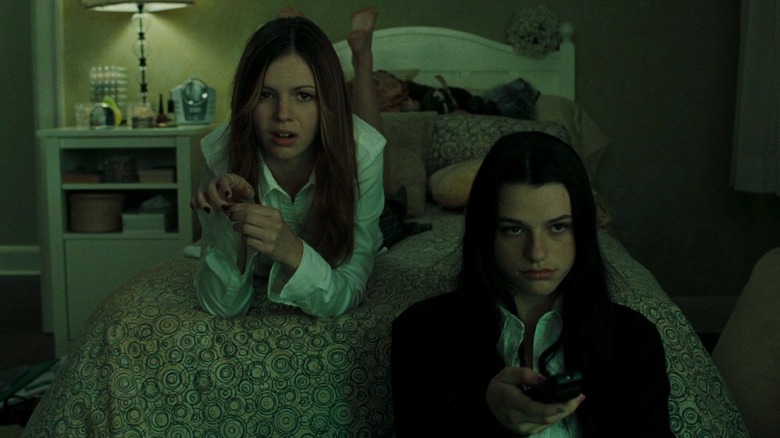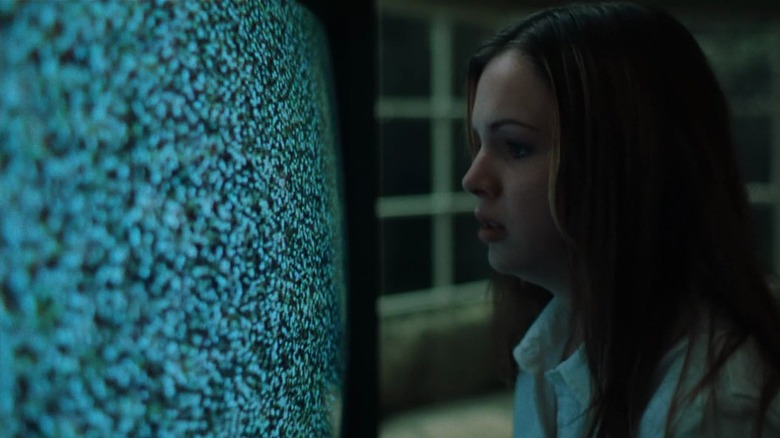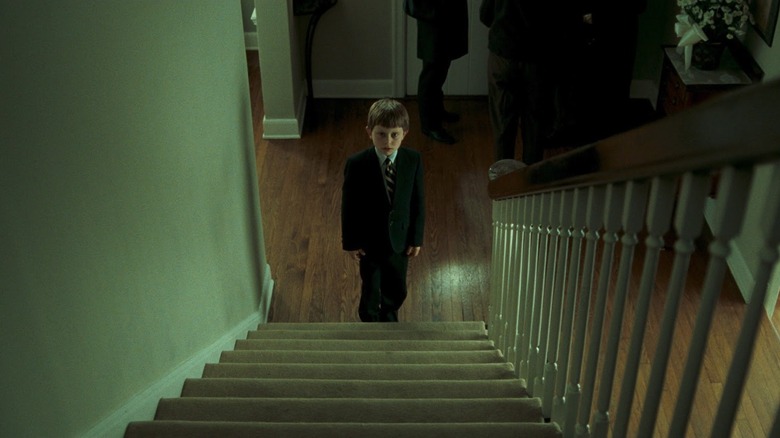The Scariest Scene In The Ring Happens In Seconds, But The Terror Lasts Forever
(Welcome to Scariest Scene Ever, a column dedicated to the most pulse-pounding moments in horror with your tour guides, horror experts Matt Donato and Ariel Fisher. In this edition: one of the scariest scenes in "The Ring" happens right out of the gate.)
I've always been easily scared. Hard to believe, I know.
Those who know me well are now laughing their asses off, and I don't blame them. I'm notoriously jumpy when it comes to watching scary movies, despite my love of them. I talk to the movies as if I'm able to influence the characters' decisions by speaking forcefully at the screen. I cover my eyes — though, never fully — and often gasp out loud. Sometimes I even scream a little. I was like this as a kid, too. Often as a result of gullibility, I'd buy into the scary stories my older cousins would tell me and have nightmares for days. I'd see faces in the dark, feel chilled by the emptiness of a room, or be frightened by loud noises.
As my husband would say, "This is my wife, she's easily startled."
I remember seeing "The Ring" when it first came out, but I couldn't tell you if I rented it or saw it in theaters. What I do know is that it absolutely terrified me. The sound of the static white noise of a dead TV channel would literally send me screaming from a room. My older brother frequently used this as a means of getting me off the shared family computer. Rude, but effective.
For me, the most profound impact in "The Ring" happens 15 minutes into the film, not long after the now-famous and often parodied opening.
Amber Tamblyn's face in the closet still haunts me.
The Setup
Gore Verbinski's remake of Hiroshi Takahashi's 1998 J-horror classic, "Ringu," has a near-identical premise. A journalist (in this iteration, Naomi Watts) must work with her ex-husband (Martin Henderson) to solve the mystery of a presumably cursed videotape that's killing people seven days after they first watch it. What follows is an investigation of the tape, its origins, and why the people who watch it are dying. Simply executed, "The Ring" is absolutely chilling. Depending on what scares you, of course. But if slow-burn paranormal sh*t gets your goosebumps going, it's for you.
The Story So Far
"Have you heard about a videotape that kills you when you watch it?"
This scene has been aped for a reason. The movie starts off with two teens, Katie (Amber Tamblyn) and Becca (Rachael Bella), just watching TV. Katie rants about conspiracy theories the magnetic waves in television and phone frequencies are causing us to lose brain cells.
Becca has a better story.
With her best Spooky Story™ voice readily equipped, Becca tells the urban legend of the tape that kills. Full of nightmare fuel, once it's done, apparently a woman comes on and you get a call saying you will die in seven days. Katie, with steely-eyed sincerity, is terrified.
She's watched the tape.
Suddenly, she starts choking out of nowhere, collapsing in Becca's lap. Panicked, Becca doesn't know what to do...that is, until Katie starts laughing.
Pillow fights and literally giggling about boys ensues, until the phone rings, and Katie suddenly looks like she's seen a ghost. "There really is a tape," Becca says, unsure what to do about her friend's fear. They answer the phone and, thankfully, it's Katie's mom, Ruth, just checking in.
With a sigh of relief, she hangs up and pours herself a glass of lemonade. But before she can leave the kitchen, the TV turns itself on to a dead channel. Nothing but static. White noise. She thinks Becca's playing a prank, but the remote control is right there in front of her. She turns it off, starts to walk away, but it turns itself back on. She screams for Becca to cut it out, lunges for the TV, and unplugs it.
Something moves in the background.
Katie jumps.
She slowly, hesitantly makes her way upstairs, finding a puddle of water in front of her bedroom door. She opens it to find her TV on, a shot of an old well in grainy black-and-white on the screen.
In a flurry of sensory input, the camera rushes towards Katie, a sound piercing the silence like nails on a chalkboard, her face instantly turning sallow, her eyes dead.
Nothing but static. White noise.
The next scene takes us to a little boy sitting alone in a classroom, his teacher watching him. A woman is coming down the hallway, the sound of her angry voice shouting to someone on the phone echoing through the closed door. Rachel (Naomi Watts) enters the classroom, flustered, clearly late. Aiden (David Dorfman), her son, seems stoic but upset. He leaves the classroom so that Rachel and his teacher (Sandra Thigpen) can talk.
Aiden's been making dark and disturbing drawings since the previous week. Rachel notes that they're pictures of his cousin, Katie, who just died. What troubles the teacher isn't his self-expression, but rather the fact that Katie only died three days ago.
They head home, driving through the rain, Rachel clearly unsure how to talk to her son. Tucking him in for bed, Aiden starts to talk about the concept of mortality. You know, light stuff for a kid. It seems Katie knew she was going to die, and said she didn't have enough time.
The Scene
The next day, they attend Katie's funeral. A somber gathering, the wake at the family's home is full of aunts, uncles, grandparents, family friends, mostly in their 40s–60s, substantially older than the deceased.
Rachel makes her way through the house and grabs her sister, Ruth, hugging her close. Her brother-in-law is vacant. "He sleeps all day," Ruth says, "doesn't move. It's too much for him."
She's baffled and grieving. No one can tell her what happened to her daughter, a 16-year-old whose heart just...stopped.
Ruth practically begs Rachel to find out. "It's what you do, isn't it? Ask questions?"
She pleads, and her face goes white.
"I saw her face."
We're ripped away from the solemnity of the moment, that sound of nails on a chalkboard, only more violent, piercing the quiet hum of mourners in the background.
A closet door slides open.
Katie sits huddled on her closet floor, her legs pulled close to her chest, her hands clasped desperately in front of her. Her face is inhuman. Deformed. Her eyes hollow, angled up. Her skin a charcoal grey. Her mouth forced open in an unnaturally large scream, crooked to the side. The camera zooms in as her head tilts forward onto her knuckles.
It all happens in three seconds.
The Impact (Matt's Take)
The art of crafting impactful jump scares is meticulous, methodical, and fragile, yet genre naysayers would argue any jump scare is a throwaway. Jabronis, the lot of them.
"The Ring" is gosh-diddly-darn horrifying and one of the better remakes to escape the oft (wrongly) maligned 2000s era of studio remake obsessions, due in large part to Gore Verbinski's calculated onslaught of terrifying visual bursts. Katie's soul-sucked, discarded husk — as Ariel times — graces the screen long enough to miss should you sneeze. No longer is necessary since Verbinski cues the grotesque crime scene evidence for a frightful stinger.
Rachel and Ruth are conversing for a solid minute; only the sound of faucet water rinsing dishes breaks the quiet kitchen scene of shed tears and sorrowful words. The length of time is enough for viewers to settle into foreseeable dramatic dialogue because there's no apparent threat beyond Katie's corpse reanimating like a zombie — something we know will not happen in "The Ring." There's zero reason for us to believe Verbinski will smash-cut to a teenager's corpse, nor do cinematic clues point towards the paralyzing interruption. It's all about perspectives and expectations, which are the lobbed setup before an inevitable spike.
Even better, Verbinski doesn't linger. Death is but an accent. The rapid flash is destabilizing in the moment, almost causing audiences to question what just assaulted their eyeholes. Was that just a contorted, jaw-agape schoolgirl pre morgue visit thrust into view? It's certainly a long enough hold to churn your stomach, but short enough to sustain an air of mystery around whatever curse has caused a healthy child's heart to cease.
Show what you need to, and never overstay your welcome at the risk of diminishing horrific effects.
Verbinski gets it.



